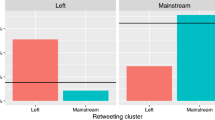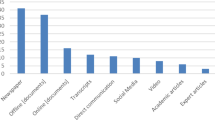Abstract
This article offers a new empirical perspective on the state of Comparative Politics (CP) in Central and Eastern Europe (CEE). We present findings on the authors, methods, and epistemology of CP publications in the most relevant journals from eleven countries in the region. The major finding is that CP is rather marginal in CEE Political Science. Furthermore, CP articles predominantly focus on the authors’ country of origin, use off-the-shelf data, apply mostly qualitative data analysis techniques, and rarely take a historical perspective.













Similar content being viewed by others
Notes
One was the replication of the World Values Survey in 1982–1983 (Tóka, 2000: 13).
As a matter of fact, the majority of the coding questions and procedures directly stem from Munck and Snyder's study. We are grateful to them for generously sharing this information with us.
The data is available at the Web site of the Center for the Study of Imperfections in Democracies (disc.ceu.hu).
Further research should aim at including the Baltic States.
Bulgaria, Moldova, Poland, Romania, and Serbia.
Some differences between journals exist that are relevant for some, but not all of our subsequent analyses. For instance, they differ in scope, with some being inter-disciplinary rather than purely Political Science journals (e.g., Slovenia, Bulgaria, Macedonia); in affiliation, with some linked to a particular academic (e.g., Czech Republic, Macedonia, Moldova, Slovenia) or research institution (Poland, Romania, Slovakia); and in age.
Our coder identified four other Political Science journals besides Godishnik.
On the basis of our data, we cannot tell which sub-discipline is dominating Political Science journals in CEE, though.
Not only can one argue that the frequency of citation is an imperfect measure of the impact of a publication, let alone its quality, but it is also plausible to expect the sheer citation numbers to be imprecise. For instance, citations for articles written in transliterated languages (e.g., Bulgarian or Russian) might be under-estimated, the same as articles on niche topics or from countries and journals that do not provide electronic versions of their publications.
In both instances, most of the references are self-citations, though.
In addition, gathering information through interviews is made difficult by the elevated level of distrust that many politicians in the region have. We thank one anonymous reviewer for pointing this out to us.
As one partial exception, Eisfeld and Pal (2010a, 2010b: 239–240) mention the collaboration within the Central European Political Science Association.
Funds for the remaining studies (8 per cent) mainly came from national funding authorities (two thirds). Only five studies (1.4 per cent) reported funding received from the EU agencies. The overall proportion of funded research might be somewhat higher given the fact that the culture of citing funding sources is still in the process of development in the region. We thank one of the anonymous reviewers for this point.
The use of empirical data in CP in CEE might also be scarce because of the strong tradition of critical theory-oriented scholarship, such as in the Ljubljana Institute for Social Sciences (Zajc, 2010) and the Zagreb University's Political Science Department (Kasapović et al, 2010).
Defined as analyses where N>35.
An alternative, mutually not exclusive interpretation is that quantitative scholars in other countries publish their articles in journals outside CEE.
Equal proportions of the Slovenian sample include in their comparisons Western European states and Hungary or Poland.
For instance, there is a journal edited at an Albanian-speaking University in Macedonia (SEEU Review, which is published in English, though), and a Hungarian-language journal in Romania, which publishes mainly articles in Political Science (Magyar Kisebbség).
For instance, the Political Science Department at the Masaryk University in Brno (Czech Republic), located a 90 min train ride from Bratislava, is known for numerous enrolments of students from Slovakia.
The investigation covered thirty-seven of the forty-one departments in the region, granting Political Science diplomas.
References
Barbu, D. (2002) ‘Political Science – Romania’, in M. Kaase and V. Sparschuh (eds.) Three Social Science Disciplines in Central and Eastern Europe: Handbook on Economics, Political Science and Sociology (1989–2001), Berlin/Budapest: GESIS/Collegium Budapest, pp. 322–342.
Brady, H.E. and Collier, D. (2010) Rethinking Social Inquiry: Diverse Tools, Shared Standards, Lanham/Boulder: Rowman and Littlefield.
Dethloff, M., Erdmann, G. and Pickel, S. (2007) ‘Aktuelle Schwerpunkte und trends der Vergleichenden Politikwissenschaft: Deutschland, Großbritannien und USA’, Zeitschrift für Vergleichende Politikwissenschaft 1 (1): 43–65.
Easton, D. (1965) A Systems Analysis of Political Life, New York: Wiley.
Eisfeld, R. and Pal, L.A. (2010a) Political Science in Central-East Europe and the Impact of Politics: Factors of Diversity, Forces of Convergence, Opladen/Famington Hills: Barbara Budrich.
Eisfeld, R. and Pal, L.A. (2010b) ‘Political science in central-east Europe and the impact of politics: Factors of diversity, forces of convergence’, European Political Science 9 (2): 223–243.
Elster, J., Offe, C. and Preuss, U.K. (1998) Institutional Design in Post-Communist Societies, Cambridge: Cambridge University Press.
Fink-Hafner, D. (2002) ‘Political Science – Slovenia’, in M. Kaase and V. Sparschuh (eds.) Three Social Science Disciplines in Central and Eastern Europe: Handbook on Economics, Political Science and Sociology (1989–2001), Berlin/Budapest: GESIS/Collegium Budapest, pp. 358–374.
Greskovits, B. (1998) The Political Economy of Protest and Patience: East European and Latin American Transformations Compared, Budapest, Hungary: CEU Press.
Holzer, J. (2011) Political Science in Central European Countries: Tradition, Contradiction, Diversity, Leverkusen: Barbara Budrich Verlag.
Karl, T.L. and Schmitter, P.C. (1991) ‘Modes of transition in Latin America, Southern and Eastern Europe’, International Social Science Journal 128 (2): 267–282.
Kasapović, M., Petković, K. and Grdešić, I. (2010) ‘Political Science in Croatia: Dropping the Plural’, in R. Eisfeld and L.A. Pal (eds.) Political Science in Central-East Europe, Opladen/Farmington Hills: Barbara Budrich.
Klingemann, H.-D. (2002) ‘Political Science in Central and Eastern Europe: National Development and International Integration’, in M. Kaase and V. Sparschuh (eds.) Three Social Science Disciplines in Central and Eastern Europe: Handbook on Economics, Political Science and Sociology (1989–2001), Berlin/Budapest: GESIS/Collegium Budapest.
Klingemann, H.-D., Kulesza, E. and Legutke, A. (eds.) (2002) Political Science in Central and Eastern Europe: The State of the Discipline in the Enlargement Countries of the European Union Ten Years After the Revolution, Berlin: Edition Sigma.
Linz, J.J. and Stepan, A. (1996) Problems of Democratic Transition and Consolidation Southern Europe, South America and Post-Communist Europe, Baltimore: Johns Hopkins University Press.
Mochmann, I., Fritz, M. and Trixa, J. (2010) ‘The Impact of the Transnational Access Activity on the European Research Area – Experiences from the European Data Laboratory at GESIS’, EUROLAB brochure for the users meeting, GESIS, Cologne, 12th March.
Munck, G.L. and Snyder, R. (2007a) ‘Debating the direction of comparative politics: An analysis of leading journals’, Comparative Political Studies 40 (1): 5–31.
Munck, G.L. and Snyder, R. (2007b) ‘Who publishes in comparative politics? Studying the world from the United States’, PS: Political Science and Politics 40 (02): 339–346.
Rybář, M. (2010) ‘Political Science in Slovakia’, in R. Eisfeld and L.A. Pal (eds.) Political Science in Central-East Europe, Opladen/Farmington Hills: Barbara Budrich.
Schneider, C.Q. (2009) The Consolidation of Democracy: Comparing Europe and Latin America, London: Routledge.
Szabó, M. (2002) ‘Political Science – Hungary’, in M. Kaase and V. Sparschuh (eds.) Three Social Science Disciplines in Central and Eastern Europe: Handbook on Economics, Political Science and Sociology (1989–2001), Berlin/Budapest: GESIS/Collegium Budapest, pp. 258–274.
Tóka, G. (2000) Inventory of Political Attitude and Behaviour Surveys in East Central Europe and the former Soviet Union 1989–1997, Bergisch Gladbach: Edwin Ferger Verlag.
Zajc, D. (2010) ‘Political Science in Slovenia: Driving Democratization?’, in R. Eisfeld and L.A. Pal (eds.) Political Science in Central-East Europe, Opladen/Farmington Hills: Barbara Budrich.
Author information
Authors and Affiliations
Corresponding author
Additional information
Supplementary information accompanies the paper on European Political Science website (http://www.palgrave.com/eps)
Electronic supplementary material
Rights and permissions
About this article
Cite this article
Schneider, C., Bochsler, D. & Chiru, M. Comparative Politics in Central and Eastern Europe: Mapping Publications over the Past 20 Years. Eur Polit Sci 12, 127–145 (2013). https://doi.org/10.1057/eps.2012.27
Published:
Issue Date:
DOI: https://doi.org/10.1057/eps.2012.27




